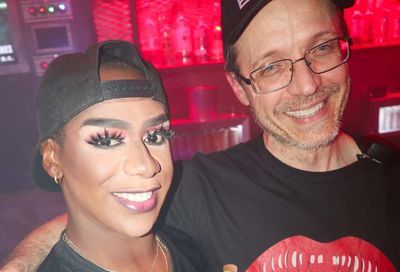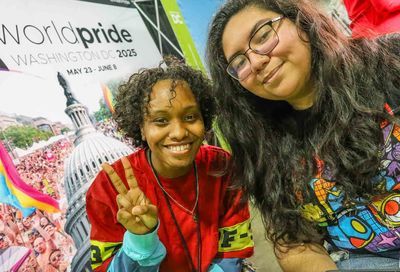Fuzzy Little Balls
Openly gay athletes like Robbie Rogers and Jason Collins make a difference in the lives of young LGBT people
I was still in elementary school when I first began banging tennis balls against the cinder-block side of my grandparents’ garage using an old wooden Jack Kramer racquet that my great uncle gave me when he gave up tennis after his heart attack. It was a summer or two later that my little hometown of Fredonia, Ky., built two tennis courts by the school, which when added to the basketball court in the gym and the baseball field by the railroad tracks combined to give us three athletic facilities in a town with no stop lights.
I took my first lessons on those courts, learning some basics that I still use to this day. When my forehand goes awry, I mime the stroke: backswing, contact, follow-through. When my service motion gets wonky, I remind myself of the three points my racquet should hit: slice the cake, scratch your back, swat the fly.
It’s unlikely that people like Roger Federer or Serena Williams were taught this way, but I’m just an amateur hack, so it worked for me.
For many following summers, those Fredonia tennis courts were a centerpiece of my life. I took lessons there, practiced there, went on family outings there. It was also where I first heard people making jokes about Billie Jean King and Martina Navratilova, because the idea in the early ’80s of lesbians playing professional sports was something to mock in middle America. Of course, the idea of gay men playing professional sports was so beyond anyone’s ken that it didn’t even come up, except to call an opponent a fag.
Because tennis has played such a huge part in my life — giving me some confidence as a teenager that I actually could play sports as I was expected to, then later in life being the sport where I met my husband — I’d always hoped that tennis would be the first major sport to see a professional male player come out while still competing. Given the long line of openly lesbian players, it didn’t seem too much to ask.
Despite my hopes, I can’t say that I was disappointed when Jason Collins made the leap in the NBA, followed quickly by this week’s Metro Weekly cover interview, soccer player Robbie Rogers. They may not play with fuzzy little balls the way I did — do feel free to titter for a moment — but I’m still proud and excited to see them take the courageous steps that will make things easier.
That’s because sports actually are important, and not just for the people who are paid to play them. I’ve been fortunate enough to interview King, Navratilova, Rennae Stubbs, John Amaechi, Wade Davis — all professional players who have understood either during their career or after that their actions speak to the thousands of young LGBT kids out there making their first forays onto athletic fields, tracks and courts.
And that’s why I believe it’s important for athletes to speak out about the upcoming Winter Olympics in Sochi and the Russian laws that effectively ban the public display or discussion of LGBT people. Just as the Olympics are meant to celebrate the ideals of competition, the games also serve to inspire the audience. I don’t begrudge any athlete the chance to compete at Sochi. I do believe that competing there carries a moral responsibility to acknowledge Russia’s cruelty and oppression. Some athletes have done this admirably; others have attempted to duck it by calling it “rude” to comment on a host.
These athletes have trained most of their lives to become the best. It’s not unfair to expect some to do better when it comes to inspiring their fans. Hitting buckets full of fuzzy yellow balls when I was a kid put me on a better and more interesting path in life. Openly LGBT athletes and those who support them will only help more LGBT kids get on those same paths.
Sean Bugg is the co-publisher of Metro Weekly. He can be reached at sbugg@MetroWeekly.com and followed on Twitter at @seanbugg.
Support Metro Weekly’s Journalism
These are challenging times for news organizations. And yet it’s crucial we stay active and provide vital resources and information to both our local readers and the world. So won’t you please take a moment and consider supporting Metro Weekly with a membership? For as little as $5 a month, you can help ensure Metro Weekly magazine and MetroWeekly.com remain free, viable resources as we provide the best, most diverse, culturally-resonant LGBTQ coverage in both the D.C. region and around the world. Memberships come with exclusive perks and discounts, your own personal digital delivery of each week’s magazine (and an archive), access to our Member's Lounge when it launches this fall, and exclusive members-only items like Metro Weekly Membership Mugs and Tote Bags! Check out all our membership levels here and please join us today!


















